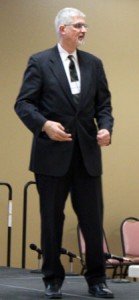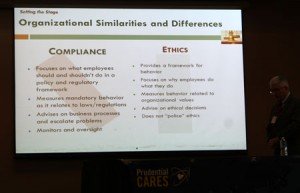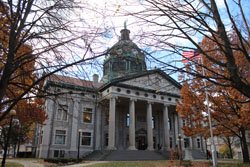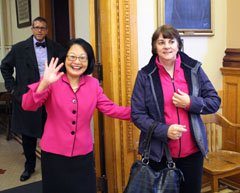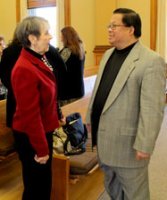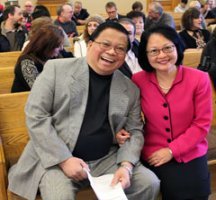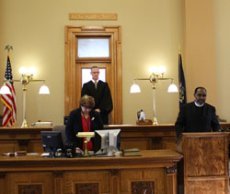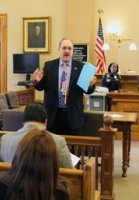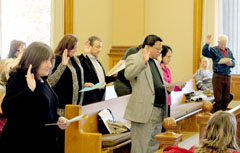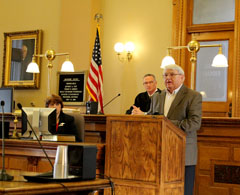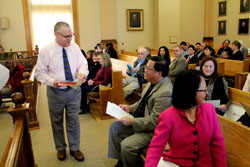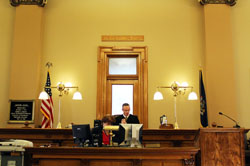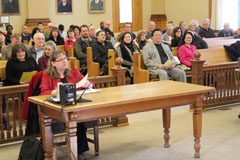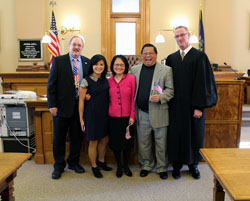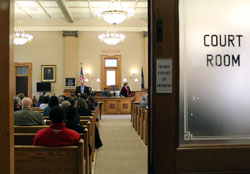Marywood University: Business Ethics: Multiple Perspectives
Starred Thoughts from the 14th Annual Conference on Leadership and Corporate Social Responsibility
Written by Tony Mussari, Sr.
Edited by Kitch Loftus-Mussari
Copyright 2016 All rights reserved
The Face of America Project
Mussari-Loftus Associates, LTD
The respect that leadership must have requires that one’s ethics be without question. A leader not only stays above the line between right and wrong, he stays well clear of the gray areas. John C. Maxwell
On March 21st our Face of America journey took us to Marywood University for the 14th Annual Conference on Ethics, Leadership and 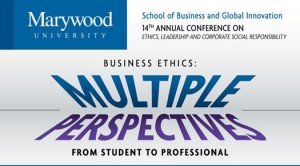 Corporate Social Responsibility. The theme of the conference was Multiple Perspectives. In keeping with the tradition of the Ethics Conference, it was an experience in community and critical thinking. It was a wonderful, information-packed learning experience for everyone who attended.
Corporate Social Responsibility. The theme of the conference was Multiple Perspectives. In keeping with the tradition of the Ethics Conference, it was an experience in community and critical thinking. It was a wonderful, information-packed learning experience for everyone who attended.
The featured speakers included James Sheridan, Pennsylvania American Water, Dr. Ahmed Gomaa, School of Business and Global Innovation, Marywood University, Dr. Christiana Hasemann, NY-Penn Nutritional Services, Inc., Dr. Murray Pyle and Dr. Rex Dumdum, School of Business and Global Innovation, Marywood University, Michael Williamson and Marygrace Wilce, Prudential Insurance and Annette Fisher and Leslie Christianson, Marywood University.
There were two student presentations: Student Perspectives on Ethics as recorded in posters students designed and a Business Case Study presented by the award winning Marywood University Student Ethics Competition Team.
The conference was organized by Dr. Murray Pyle, his wife Ellen Sherwood and Dr. Monica Law. They had help from members of the Marywood community.
Ethics in an IT Environment: More than Ones and Zeros
Starred Thought
“Privacy doesn’t exist anymore”
When we arrived at the conference, Dr. Ahmed Gomaa was discussing 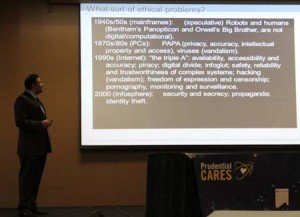 Ethics in an IT Environment. The slide on the screen outlined a history of ethical problems from the 1940s/50s to the problems we face today, security and secrecy, propaganda, and identity theft.
Ethics in an IT Environment. The slide on the screen outlined a history of ethical problems from the 1940s/50s to the problems we face today, security and secrecy, propaganda, and identity theft.
At one point in his presentation, Dr. Gomaa got everyone’s attention when he spoke these five words, “Privacy doesn’t exist anymore.” Rapidly declining data storage costs lower the cost of creating huge national databases comprised of private information.
There are some real-world IT ethical dilemmas like the use of systems to monitor employee e-mail to protect valuable assets, but decreasing employee privacy and monitoring employee use of the Internet at work decreasing employee privacy. He addressed the moral implications of this problem and the need to develop guidelines to protect a person’s right to privacy.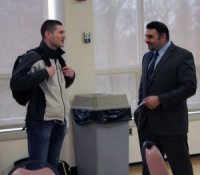
During the question and answer session, Dr. Gomaa made it very clear that there is no absolute right to privacy. Using the current conflict between the U.S. Government and Apple regarding the encryption issue, Dr. Gomaa told the audience, no one is above the law. If a judge offers a ruling that the encryption must be broken, this decision must be respected.
During the intermission, I had the pleasure of meeting a very personable student, Tom Skrutski. I asked him if he agreed with Dr. Gomaa’s position about the encryption issue. Without hesitation, he said he did. When our security is at stake, he told me, no one is above the law.
Current Issues in Health Care Ethics
Starred Thought
“In ethics not all questions have answers especially in health care.”
It was a special moment when Dr. Alice E. McDonnell, author of 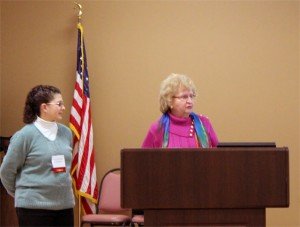 Managing Geriatric Health Care Issues, introduced Dr. Christiana Hasemann, a registered dietitian and President/CEO of NY-Penn Nutrition Services, Inc. Christiana was a student of Dr. McDonnell, and she is justifiably proud of Christiana’s many accomplishments in the health care field.
Managing Geriatric Health Care Issues, introduced Dr. Christiana Hasemann, a registered dietitian and President/CEO of NY-Penn Nutrition Services, Inc. Christiana was a student of Dr. McDonnell, and she is justifiably proud of Christiana’s many accomplishments in the health care field.
These are a few of the key points in Christiana’s presentation:
1. Nearly every decision in the health care has ethical implications;
2. Ethics committees are necessary in health care venues;
3. The five top ethical issues are: improving access to care; building and sustaining the healthcare workforce for the future; addressing end of life issues and allocating limited medications and donor organs;
4. Everyone should be treated equally and fairly;
5. What should drive healthcare decisions: Quality or Efficiency?
6. Some of the most challenging ethical issues involve the cost of care for the elderly, care for the mentally ill or cognitively impaired.
Christiana provided the students with an 8-step framework for ethical decision-making: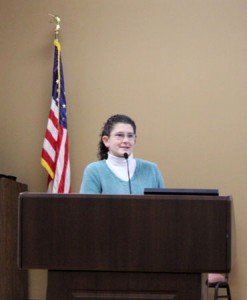
1. Identify Ethical Issues;
2. Clarify Values;
3. Clarify Influencing Factors and Barriers;
4. Define Guiding Principles;
5. Analyze Alternatives;
6. Find Common Ground;
7. Decide and Act;
8. Assess Outcomes.
Christina concluded her presentation with this starred thought:
Not all questions will have answers in ethical dilemmas. The hope is that through careful thought, discussion and deliberation, questions and answers will intersect for an outcome that is ethically sound!
Culture, Values and Leadership
Starred Thought
“The basis of culture is shared values.”
Shortly after 3 p.m. Dr. Murray Pyle asked this question:
What is organizational culture, where does it come from and how does it relate to ethics, corporate social responsibility and leadership?
He explained that many things contribute to culture: family, religion, language, social networks.
The basis of culture is shared values.
Drawing from the work of Edgar Schein, Dr. Pyle explained organizational culture as a pattern of shared basic assumptions learned by a group as it solves its problems.
There are three levels in Organizational Culture:
1. Artifacts – Easily observed like the design of buildings and behaviors. What we see, feel and do;
2. Espoused values-The stated values/rules, goals, philosophy as articulated by management. The values we pretend to venerate;
3. Assumptions-The root of culture…the hidden or unspoken behaviors of people in the organization.
Dr. Pyle made an important point when he emphasized that the espoused values and the lived values are often not the same. Effective leaders make sure this does not happen.
Dr. Pyle’s colleague, Dr. Rex Dumdum, drew insights about leadership and cultural organization from a very famous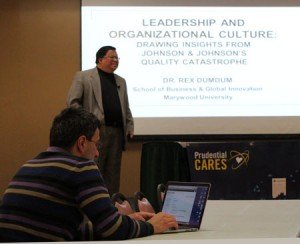 Harvard Case Study about Johnson & Johnson. Quoting Edward Schein, Dr. Dumdum made the point that leaders create, build, maintain and change the culture.
Harvard Case Study about Johnson & Johnson. Quoting Edward Schein, Dr. Dumdum made the point that leaders create, build, maintain and change the culture.
There was a time when Johnson & Johnson had a sterling reputation. In 2010, a congressional investigation of the company raised questions about its integrity. It painted a picture of a company that is deceptive, dishonest and risks the health of many people.
In 1982, Johnson & Johnson’s CEO emphasized quality not quantity.
Almost a generation later in 2009, the CEO expected employees at Johnson & Johnson to do their job fast. They were encouraged to make it look good, and get it done as fast as possible. Management pressured workers to take shortcuts. The dominant force in the company was profit not quality. Marketing had a higher priority than science.
The result of this culture is recorded in this statistic. Between 2008 and 2011, there were more than 50 voluntary recalls.
Starred Thought:
“There is a direct relationship between organizational culture, corporate leadership, ethics and corporate social responsibility.”
Ethics: A Powerful Force in the Financial Services Industry
After he told the audience that insurance companies are in the 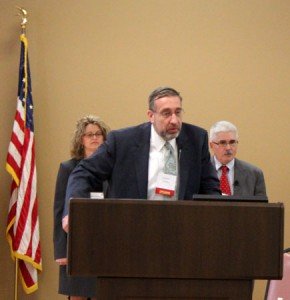 business of making and keeping promises, Robert Tyndall, a senior Vice President for Strategy, Planning and Risk Management at Prudential Financial Services, set the tone for this session with his definition of ethics:
business of making and keeping promises, Robert Tyndall, a senior Vice President for Strategy, Planning and Risk Management at Prudential Financial Services, set the tone for this session with his definition of ethics:
Ethics is what you do when no one is looking.
Then he introduced Michael Williamson and Marygrace Wilce to explain why Prudential takes ethics very seriously.
These are few of the starred thoughts from their presentation:
Really good companies practice what they preach. That is what we do at Prudential.
We tell our employees that we one company with one brand and one reputation.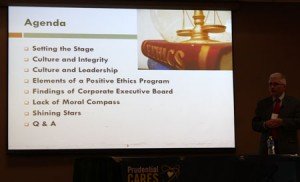
We respect the Buffett rule: It takes 20 years to build a reputation and 5 minutes to ruin it. If you think about that, you’ll do things differently.
The Prudential code of conduct is 109 pages long. It is deeply rooted in honesty, forthrightness, and using good judgment.
Ethics is a framework.
Culture matters.
Culture trumps compliance every time.
It’s not about getting results. It’s about how you get results.
Strong Ethics equals good business results.
A good ethical culture results in less employee misconduct and higher productivity.
Prudential encourages and trains its employees to win with integrity.
Culture begins with leadership.
Successful leaders are good role models.
All of us are leaders in one way or another. The tone at the top is important. It trickles down
Integrity drives brand. Brand drives profit.
Create a “safe to say” environment where associates feel safe to raise their hand when there is a problem.
Rationalization is a deadly sin.
Academic Integrity: What Does It Really Means and Why Do you Need to Know?
The final session of the conference was conducted by two librarians from Marywood, Annette M. Fisher and Leslie Worrel Christianson.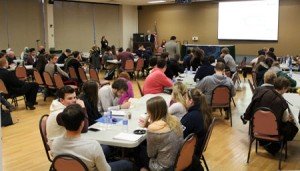 Annette is the Information Literacy librarian. Leslie is User Services librarian.
Annette is the Information Literacy librarian. Leslie is User Services librarian.
Using various items including Goodnight Moon, a Barbie doll and a Coke bottle, Annette defined copyright, plagiarism 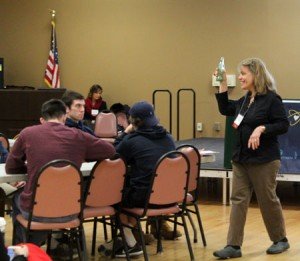 and patent.
and patent.
The first copyright law was passed by congress in 1710. The length of the copyright has been changed several times. The essence of a copyright is a contract between an author and society. There are two requirements for a copyright:
1. The item must be an original work;
2. It must be an expression of an idea fixed in a tangible medium.
In 1998, the Sonny Bono Copyright Term Extension Act lengthened copyrights to the life of the owner plus 70 years. The heirs of the person who copyrighted the material own the copyright for 70 years after the author’s death. If the copyright is not renewed, it goes into Public Domain.
Trademarks must be registered every 10 years, and patents every 20 years.
Coca-Cola is an example of all three: Copyright, Patent and Trademark.
Annette made it very clear that academic dishonesty is claiming someone else’s work as your own.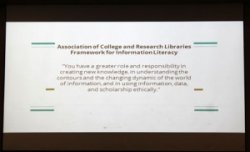
Using information from the Association of College and Research Libraries Framework for Information Literacy, she summarized her starred thought with these words:
You have a greater role and responsibility in creating new knowledge, in understanding the contours and the challenging dynamic of the world of information, and in using information, data, and scholarship ethically.
Leslie dedicated her time to what she called the moral code of academia…Academic Integrity.
Everything in her presentation was designed to emphasize how a student or teacher could use information ethically, because in our information society, information has become the central and most 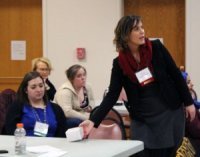 significant commodity.
significant commodity.
In our information-knowledge based culture, it is more important than ever to use information ethically.
Using a small package, she challenged the students with three questions:
What is your knowledge product?
What is its value to society (Economic, Social, Political Influence)?
How can it negatively impact society?
A Special Moment
Before we left the Nazareth Student Center, we stopped to talk with the students who helped to make the conference a success. They greeted everyone who attended the event. They worked at the registration desk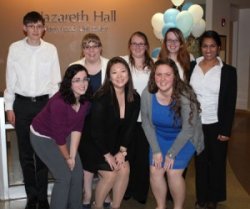 answering questions and providing directions. They were welcoming, pleasant and very helpful. It was a long day for them, but they were as enthusiastic at this late hour as they were when we arrived.
answering questions and providing directions. They were welcoming, pleasant and very helpful. It was a long day for them, but they were as enthusiastic at this late hour as they were when we arrived.
When I asked for their cooperation so that I could get a group picture, they did not hesitate to respond positively to my request.
They did not realize it at the time, but they and their behavior reflected the light of one of the things the ethics conference is all about. They demonstrated respect for themselves and respect for others. Watching these students throughout the day gave truth to the axiom Actions speak louder than words.
Final Thoughts
On March 22, Kitch and I wrote a note to Murray Pyle. It summarizes our feelings about the wonderful learning opportunity:
Good Morning, Murray:
I am sure your inbox is filled with congratulatory notes so I will make this one short and to the point.
You and your colleagues have every right to be walking on Cloud 9 this morning.
The Ethics Conference was a wonderful, information packed learning experience for everyone who attended.
Kitch and I enjoyed the sessions we attended.
Thank you for all that you did to make the conference a success, and thank you for your kind invitation.
Kitch and I hope to write something about our experience. I will let you know when our article is finished.
Have a peaceful and enjoyable day on Cloud 9!
(Digital photographs by Tony Mussari)
Please provide feedback to:
tony.mussari@gmail.com
